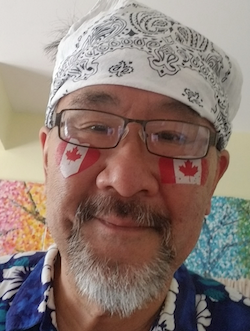Years ago, when traveling in Afghanistan was much safer than it is today, freelancer David Macfarlane received a letter from a friend visiting that country. “If you really want to get to know a place,” the friend wrote, “smoke a lot of opium and walk around it.” While Macfarlane doesn’t recommend the former as a journalistic tool for profile writers, he does endorse the latter. “To get to know a place, what you have to do is hang around a lot.” 
PWAC's Luigi Benetton moderates a discussion on profile writing with Alec Scott, David Hayes, David Macfarlane and Sharon Crawford.
Photo credit: Sharon Aschaiek, PWAC Toronto
Macfarlane offered this advice last night at a Professional Writers Association of Canada seminar on profile writing, held at the Northern District Library in Toronto. A four-person panel, which included Macfarlane, David Hayes, Alec Scott and Sharon Crawford, offered insights, strategies and tips to a room full of writers and editors on what Hayes called the “common currency of journalism.”
Macfarlane, who spoke about profiling communities, said spending time in and around the place you’re writing about is the best way to find your story. “You have to be willing to leave yourself open to chance,” he said. “You have to let things happen.” Macfarlane said he once spent seven hours in Maple Leaf Gardens watching ice being prepared before the start of the season. “People would come and to talk to me,” he remembered. “Gradually stories would begin to emerge.”
Hayes reminded the audience that profiles belong to the writer, not the subject. “There’s the subject. And with that subject there’s a theory, a point-of-view, an angle, a take.” Hayes, who focused on “institutional” profiles, said there’s little difference between a profile of a business and a profile of person. All profiles should be “animated by people,” he said.
Scott said finding an interesting character is the key to good personality profiles. He uses the phrase “a magazine personality” to describe the kinds of people he likes to pitch to editors: “Big personalities who like to tell you their stories.” He remembered being assigned to profile an artist who greeted him with the phrase: “I guess you already know all about my drug problem.” Scott admits there’s an element of “pop psychology” to profile writing, but says that’s “part of the fun of it.”
Crawford focused on integrated profiles and offered this advice on interviewing technique: “Be prepared to improvise as you go along, because you don’t know what they’re going to say.” Peculiar details make for great reading, she added. “The more quirky the person you’re interviewing is, the more interesting the story will be.”
 |
|
| Jaded says: | |
Wow, Torstar really seems to be on a mission to bankrupt one magazine after another.... |
|
 |
|
| Lorene Shyba says: | |
Full of terrific information, Thanks!... |
|




